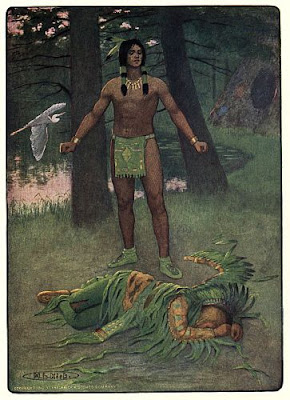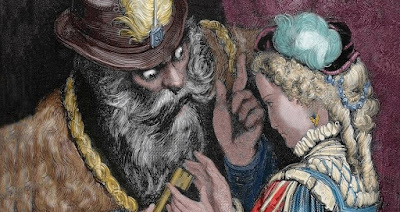Week 10 Reading Notes: Song of Hiawatha A
This week, we're covering Native American mythology. Here in Oklahoma, you do occasionally hear some of the old stories from displaced tribes such as the Cherokee or Chickasaw, but they still aren't nearly as common as Bible stories or classic English tales, built into our history. However, stories and folktales from further off peoples aren't common, so I selected the Song of Hiawatha as a story from a unique place that formed one cohesive narrative. And, I enjoy heroic tales after all.
The first thing that stuck out to me was how bad I am at keeping up with verse poetry. While I realized I somewhat signed up for this, I find it difficult to both read/comprehend a story/keep up with its characters and try to manage the verse at the same time. While this one is in decently modern language, the heavy use of Native words made it a difficult read.
The story that caught my attention the most of the first half was the Fasting of Hiawatha. This sort of strength narrative, taken literally (he actually met a god) or figuratively (he hallucinated something that gave him strength), offers an incredibly interesting and unique manner of character development not often found in Western stories. Generally, in European stories, the hero becomes stronger through defeating external forces (and possibly experiencing some defeat themselves), where as this story is about how Hiawatha's own struggle with his own hunger and self leads to the grand revelation and creation of maize, an important staple to that area's diet. Such a genesis story is always interesting, especially when it's the deeds of one that brings forth a greater good for all. This tale goes to show that not all hero stories are about defeating a great evil, but accomplishing something not everyone can.
Bibliography: The Song of Hiawatha Parts 1 and 2. Untextbook Link
The first thing that stuck out to me was how bad I am at keeping up with verse poetry. While I realized I somewhat signed up for this, I find it difficult to both read/comprehend a story/keep up with its characters and try to manage the verse at the same time. While this one is in decently modern language, the heavy use of Native words made it a difficult read.
 |
| Hiawatha Defeats Mondamin |
Bibliography: The Song of Hiawatha Parts 1 and 2. Untextbook Link



Comments
Post a Comment